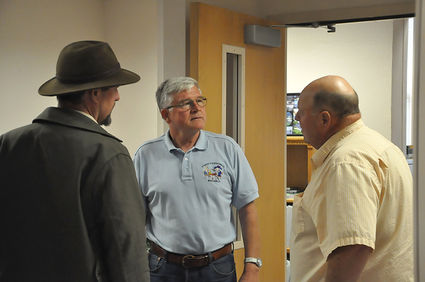County loses $1 million in last minute legislation
July 16, 2015

Rick Nelson
L-r, State Representatives Brian Blake and Dean Takko and county Commissioner Dan Cothren discuss the next steps in their efforts to boost the county's funding from its trust timber lands.
One of the final actions of the 2015 Washington state legislative session has left Wahkiakum County commissioners fuming.
Commissioners expected Wahkiakum to share an appropriation of $3 millon with Pacific and Skamania counties. The funds were appropriated to compensate the three counties who have trust timber land tied up for environmental habitat conservation areas.
But hours before the budget was approved on Friday, commissioners learned that all the funds would go to Skamania County.
After discussing the situation Tuesday with District 19 Representatives Brian Blake and Dean Takko, commissioners and Blake said they would contact legislative officials to discuss the situation.
"It took the wind out of my sails," said Commissiner Dan Cothren.
Cothren commented that he had worked closely with commissioners from Pacific and Skamania counties, the District 19 representatives, and officials from the Department of Natural Resources, which manages the trust timber for the counties, to develop legislation for the payments. The appropriation started at $6 million--$2 million for each county--and was whittled down to $3 million.
The money would be funneled through the DNR, Cothren said.
"I'm upset," Cothren said Tuesday. "The whole amount going to Skamania is quite a surprise. This never should have happened."
Commissioner Blair Brady agreed. He had lobbied for the appropriation through the Washington State Association of Counties (WSAC) and he had fully expected the appropriation to be shared by the three counties.
"The DNR lobbied with us. I was assured by the Senate that it would be there," Brady said.
After making a phone call to a colleague, Rep. Blake reported that the change apparently came at the hand of an eastern Washington senator.
The officials seemed unsure if the change was intentional or some kind of clerical error.
Both Blake and Cothren said they would communicate with their contacts and try to learn exactly what happened.
Blake suggested the representatives could introduce corrective legislation in the next session.
Cothren and Brady (Commissioner Mike Backman is in Alaska) said they would also like to explore the feasibility of passing legislation that would allow the county, not the DNR, to manage its timber.
Commissioners feel the county could manage the timberland cheaper than the DNR. The agency takes a 25 percent commission off timber sales, and legislation this year will raise that in increments to 30 percent.
That means, Cothren explained, that from $1 million in revenue, the DNR will take $300,000.
Commissioners feel they could hire forestry consultants to do the work much cheaper, similar to the rates of private industry.
The move should also allow the county to remove its timberland from the DNR's Habitat Conservation Plan, which was established to guide the agency's protection of habitat for endangered spotted owls. The lands have subsequently seen acreage set aside for habitat protection for marbled murrelets.
Blake said the commissioners should consult with commissioners from other counties to gauge the level of their support.
"We're going to need broader support in the other counties," Blake said. "I would sponsor the legislation in a heartbeat."
Cothren said the county needs to act carefully because he's working with the DNR on a plan that would enable the county to acquire more timberland.
"It's a very tough position to be in," Cothren said. "I have to find the whole picture. There's a good opportunity for us to increase our timber base."
"This has been done to us by the legislature and the governor," Brady said. "The governor gave state employees a raise, and the DNR has to raise fees. They're picking our pockets."
The legislative session, although very long, had some good results, said Representatives Blake and Dean Takko.
Although the transportation package had no specific Wahkiakum projects, it funds projects nearby that will benefit vehicle movement overall. One project receiving funding is replacement of the SR 4 bridge over Abernathy Creek.
"In the end, I think it's a pretty good budget," Blake said. "It's the second largest increase in history. Some of the wins are mental health, which I focused on, and reduced college tuition.
"I'm concerned that the budget isn't as sustainable as people think it is. Time will tell."
Takko agreed. The state received $70 million in taxes of the sale of legal marijuana, and budget writers predicted that total would go up to $250 million next year, $1 billion over four years. "I'm afraid it isn't sustainable," he said.








Reader Comments(0)